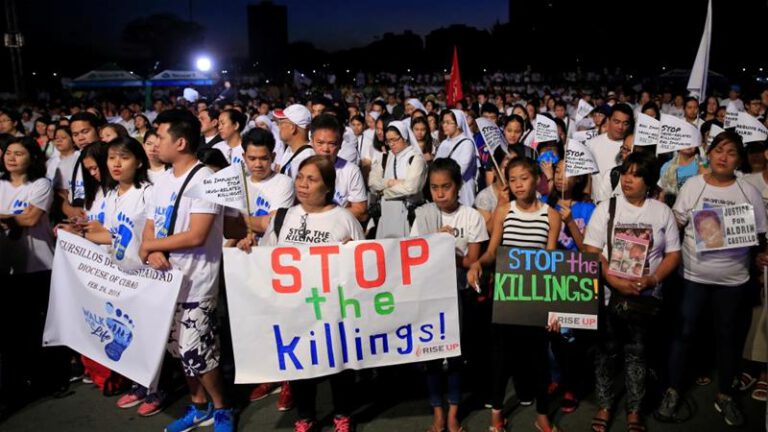
Oct 7, 2020, Jodesz Gavilan
Human rights group EcuVoice fears the government will use the programs indicated in the resolution as ‘smokescreen’ to conceal apathy and disregard toward victims while continuing to attack critics
Local human rights groups on Wednesday, October 7, expressed “serious reservations” about a United Nations Human Rights Council (UNHRC) resolution that offers the Philippines “technical assistance” to address killings in the country.
In a statement, the Ecumenical Voice for Human Rights and Peace in the Philippines (EcuVoice) doubted that the resolution would put an end to the widespread violations and abuse under President Rodrigo Duterte.
It pointed out that the resolution stopped short of providing “more meaningful actions” against the culture of impunity in the country.
According to the group, prosecution of perpetrators and actions against abusive policies are the “crucial indicators in addressing the strong and persistent demands for justice and accountability.”
“We believe that programs for technical cooperation and capacity building would not decisively curb the worsening human rights situation in the country,” EcuVoice said.
The resolution adopted by the UN also calls for technical cooperation between the government and UN bodies in addressing the issues in the country.
It was proposed during the 45th Session of the council by member-states Philippines, India, and Nepal, together with UNHRC non-members Hungary, Iceland, Norway, Thailand, and Turkey.
Failure to launch probe
The key part missing in the resolution was the launching of an independent investigation, which many human rights groups have been lobbying for amid continuous killings, including under Duterte’s violent war on drugs. (READ: More killings feared if UN Human Rights Council fails to act vs impunity in PH)
Figures from the Philippine National Police show that there have been 7,884 deaths during police operations from July 1, 2016 to August 31, 2020. Groups estimate the total number of fatalities in the drug war to have reached more than 27,000 already, to include victims of vigilante-style killings. (READ: The Impunity Series)
Instead of an investigation, the UN rights office will engage with the Duterte government to assist its domestic measures, data gathering, and human rights-based approaches to drug control, among others.
While the resolution is indicative of the international bodies’ continuous monitoring of the situation, EcuVoice fears that its provisions will be used by the Duterte administration to evade accountability given its track record of dismissing concerns and threatening critics.
“We even fear that the government may abuse such programs and use these as smokescreen to conceal their apathy and disregard toward the victims, or to commit reprisals against activists and human rights defenders engaging in the process,” the group said.
Independent investigation still needed
Karapatan, meanwhile, said the resolution “disappointingly looks over the urgent demands” of communities, and falls short of “a decisive and adequate response” to the country’s worsening situation.
But the group challenged the Philippine government to abide by the provisions of the resolution and “allow the access of UN human rights mechanisms in the country to assess domestic accountability mechanisms if they are truly working and if they have nothing to hide.”
Advertisement
“These so-called domestic mechanisms have been presented routinely to portray a robust democracy, yet time and time again, these have been exposed to have utterly failed in delivering justice and accountability for victims of human rights violations,” Karapatan secretary-general Cristina Palabay said.
The resolution comes amid mounting international pressure on the Philippines, including the recent European Parliament resolution and the ongoing preliminary examination of the International Criminal Court.
It was also adoped in the aftermath of a scathing report released by UN rights chief Michelle Bachelet in June 2020, in which her office pointed out that that local systems have so far failed to exact accountability for the killings.
Bachelet also said that the drug war is being carried out “without due regard for the rule of law, due process, and human rights.”
EcuVoice reiterated its call for a thorough and comprehensive investigation into the killings under Duterte. These accountability mechanisms, it added, should be “removed from the clutches of those who have been perpetrating and emboldening the commission of human rights violations.”
“To leave the investigation in the hands of the same government which has continuously shown disregard of our rights would result in a mockery,” EcuVoice said.
The National Council of Churches in the Philippines (NCCP) also said that the resolution “falls short of our expectations.” Rappler.Com